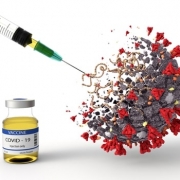In a roundup of some of the latest scientific studies on the novel coronavirus and efforts to find treatments and vaccines for Covid-19, a new study may help identify which Covid-19 patients with signs of heart injury are at higher risk for death.
FibroGen Provides More Support for Roxadustat in Anemia Associated with Kidney Disease Published: Oct. 26, 2020 By Mark Terry BioSpace FibroGen presented data from two pooled analyses from its roxadustat global […]
Days after the U.S. Food and Drug Administration greenlit the restart of AstraZeneca’s Phase III Covid-19 vaccine trial, the U.K.-based company said the preventative medication boosts immune responses in older and younger adults against the novel coronavirus.
Novartis released promising interim Phase II data of iptacopan in C3 glomerulopathy (C3G) at the virtual American Society of Nephrology 2020 Annual Meeting.
Spectrum Pharmaceuticals announced that an inspection of the Hanmi Bioplant in South Korea will be necessary before the U.S. Food and Drug Administration can approve the company’s Biologics License Application for Rolontis (eflapegrastim).
Bayer is making a big bet on gene therapy with the acquisition of North Carolina-based Asklepios BioPharmaceutical (AskBio).
U.S. infectious disease expert Anthony Fauci said it would be clear whether a Covid-19 vaccine was safe and effective by early December, but that more widespread vaccination would not be likely until later in 2021.
Federal health regulators decided to allow the resumption of the U.S. trial of a leading Covid-19 vaccine candidate from AstraZeneca Plc and the University of Oxford, the Wall Street Journal reported, citing a person familiar with the matter and materials reviewed by it.
The U.S. Food and Drug Administration and the U.S. Centers for Disease Control and Prevention presented details about Covid-19 and the requirements for a vaccine in a nine-hour virtual meeting.
Alnylam Pharmaceuticals presented complete results from the company’s ILLUMINATE-B Phase III study in children under 6 years with primary hyperoxaluria type 1 (PH1), a rare disorder affecting the kidneys.










